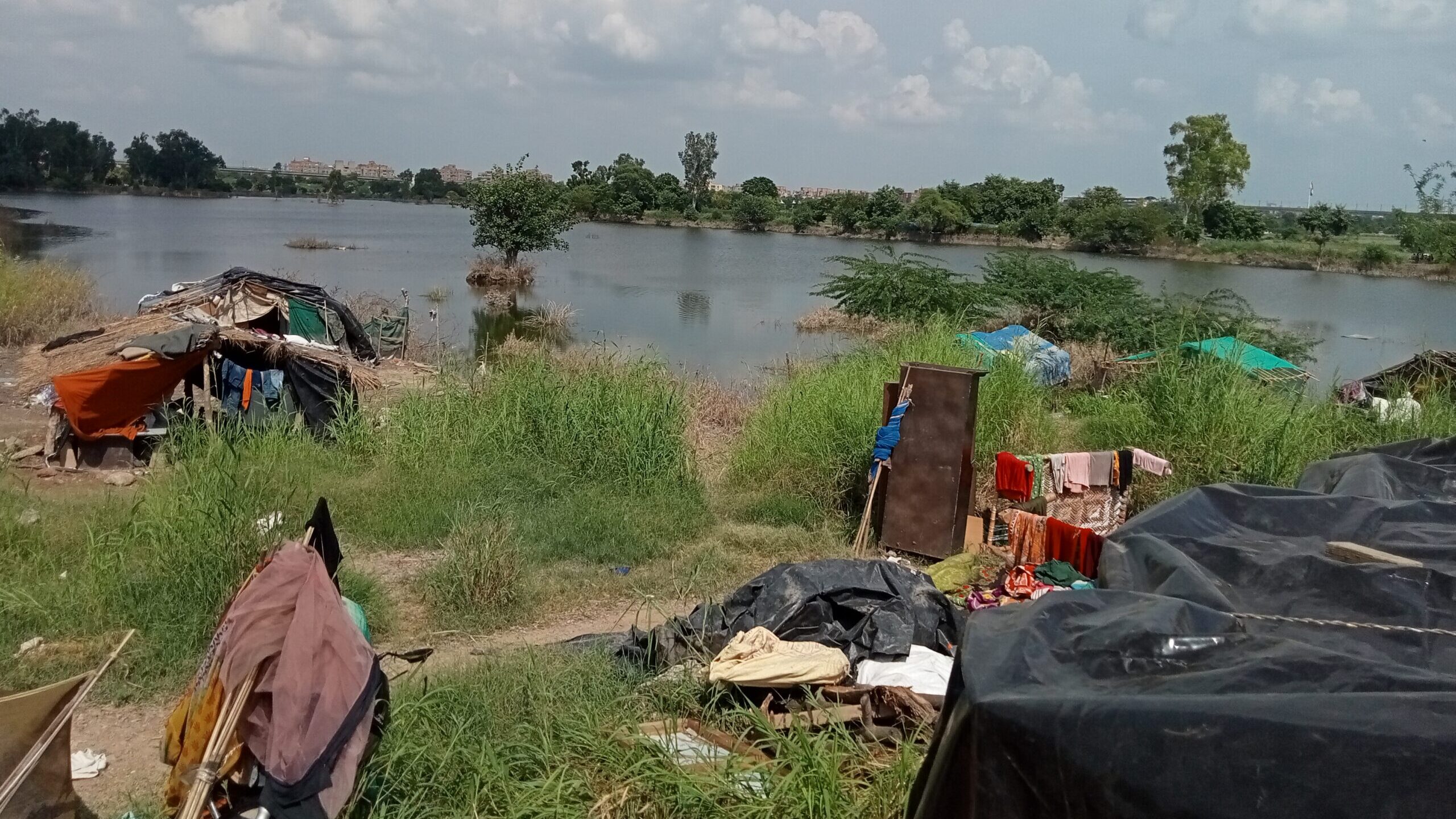The water level in the Yamuna river crossed the warning level on 12 August. As per officials, the flood control room reported that at 7 pm on 13 August, the water level at the old Iron Bridge, which is used as a baseline for measuring the city’s flood condition, was at 205.92 metres. At the railway bridge, 204.5 metres is the warning level and 205.33 metres is the danger level.
Most of the families living on the floodplains started evacuating their houses on the night of 13 August, as knee-deep water reached their hutments. They shifted to government shelters and higher plains.
When Patriot reached Yamuna floodplains near Sarai Kale Khan, Kashish, a 13-year-old girl, was sweeping out her home. Kashish said that they evacuated the house on Saturday and lived in the government shelter for around four days. They have suffered financially as Kashish’s father works in a nursery where plants were badly damaged.
“Times are going to be really hard now because all the plants are spoiled and we have no other means of livelihood,” Kashish says. Apart from working in the nursery and as an occasional gardener, her father also works as a labourer when work is available.
Bhaiya Ram, who shifted to the area a few months ago after his previous hutment was demolished by the administration, says that all his plants are ruined. He also shares that his nurseries are often bulldozed and he faces great financial loss. “This happens all the time. If you need any plants, just let me know”, he remarks, refusing to answer any more questions.
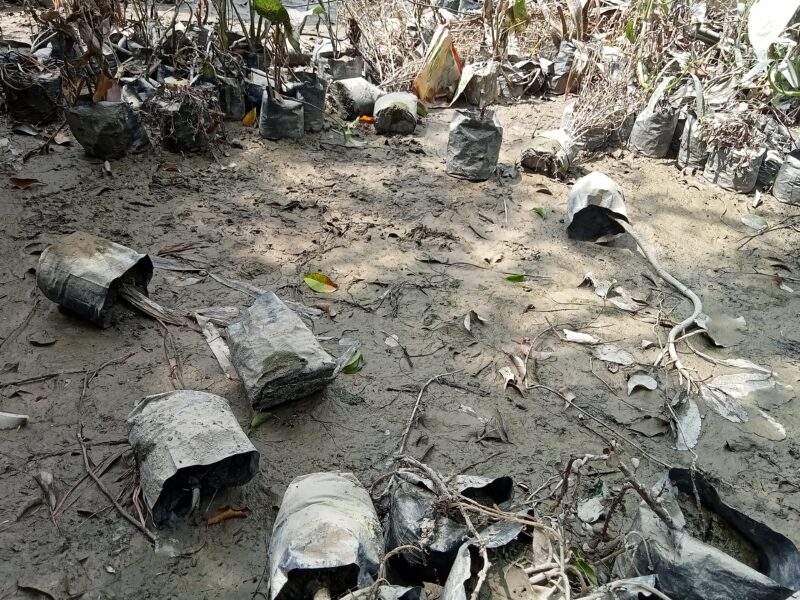
Precarious conditions
According to Netrapal, a 62-year-old native of Chharra Rafatpur, Uttar Pradesh, there are almost 60 families living near the Yamuna floodplains in Sarai Kale Khan. He has been living in the area since 1990 and informs that most of the families come from remote villages of Aligarh district in Uttar Pradesh.
He complains about the quality and quantity of government relief measures. “Although the tent facilities were good, the food was very little in quantity. Our children usually eat at around 9 am but during the flood time, we received food at around 2 pm, and as late as 4 pm”, he says. The meal usually contained pulses and rice, and at times, roti and biryani.
Echoing his sentiments, a woman says, “They do not give meals to those who are not present at the moment. Our children are small and the men in the family go to work, so can they be present just for the food?”
Netrapal says that there were around 60 makeshift shelters with only two toilets for men and two for women. However, this was not a big hassle as due to unavailability of toilets on normal days, the people living in the area are used to relieving themselves in the open.
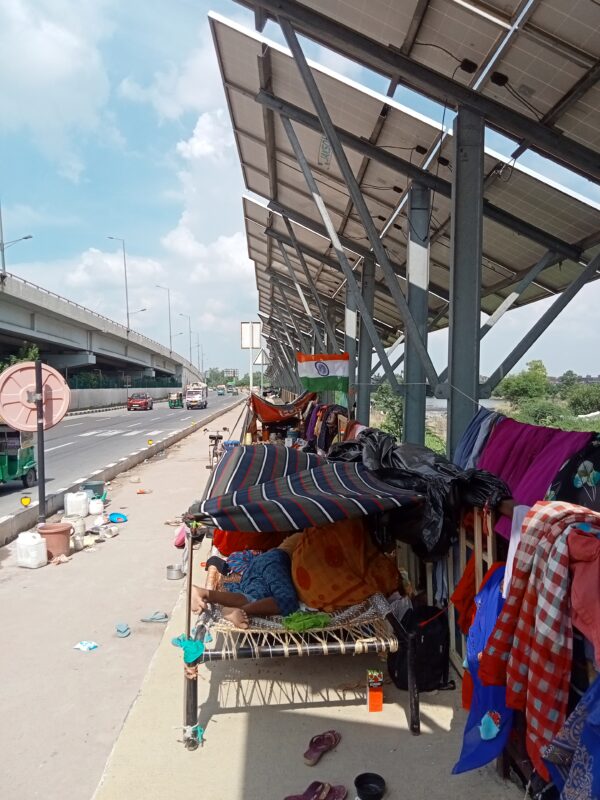
NOT A DROP TO DRINK
Ironically, despite the excess of swirling flood waters, access to drinking water remains a big problem in the area. There is not even a single pipeline and handpumps provide smelly water which often leads to health problems. They have made a hole in the water supply line that runs along the flyover nearby to get water.
“There has been a water problem since the day I came here. Politicians and officials come and go, but the problem remains the same. Sometimes we have to wait for hours in line to get a few cans of drinking water from tankers”, Netrapal says.
In the floodplains of Hathi Ghat near ITO, the water situation is the same as in Sarai Kale Khan. However, people living in the area, most of them from UP, can avail drinking water from a nearby well provided by Delhi Jal Board – the office of which is located nearby.
During floods, water tankers were provided. However, like all the places Patriot visited, this provision lasted only for a few days as a part of flood relief.
The forty families living here have been hit hard as most of them depend upon farms carved on the river banks. If they work in other fields, the daily wage is Rs 150.
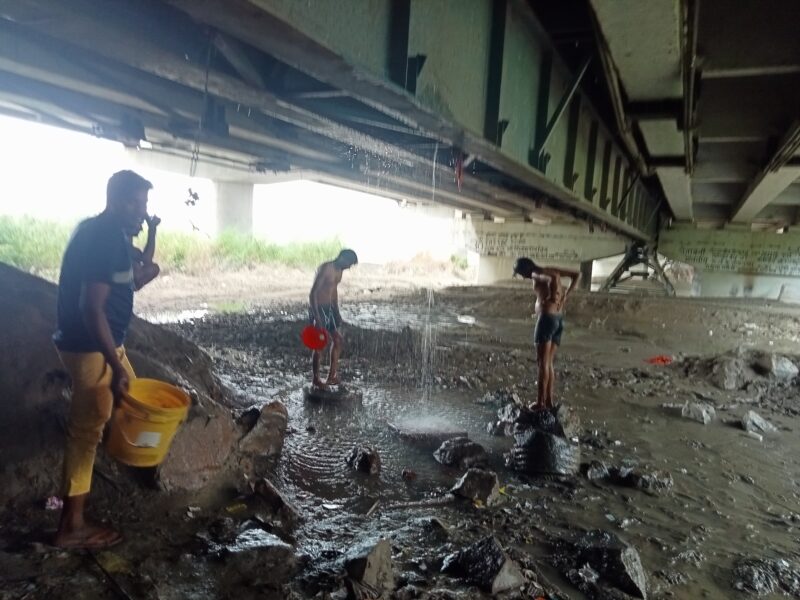
“Government only provides rations or tents during the flood, otherwise we are on our own”, says Zakir, a 30-year-old native of Jagdishpur, UP. “We have to do multiple jobs as farming does not provide enough”, he adds. Zakir works as a labourer while his father works as a farmer.
“Thank God that this time the flow of water was relatively slow. Otherwise, we face a lot of damage due to flooding. Most of our household products and animals sink in the water”, says Bano, who has been living in the area for 40 years. A lot of families have spent two generations in the area.
JUST A VOTE BANK
Bano also informs that they have been issued a notice regarding the bulldozing of their huts. “They just want our votes and then they treat us like cockroaches”, Bano says. “Tell me, are we not citizens of this country with valid documents and ID proofs?”, she asks.
In low-lying areas near Akshardham, the situation is more precarious. A lot of the families had to stay on the service road as the shelters provided are limited in number and situated very far from the huts. “We cannot carry our belongings to the end of the road and most of the huts were occupied anyway, so we stayed on the road”, says Manju.
Although the families were sometimes provided with food and water, they resorted to cooking their own meals due to the inadequate quantity of food and the time gap between meals. The majority of people work in the nurseries and are deeply affected by the flood.
Jagdish Kumar says that the water came all of a sudden and they had no advance warning. “We remain vigilant whether the water is hitting our areas or not”, he says as he looks at his drowned huts.
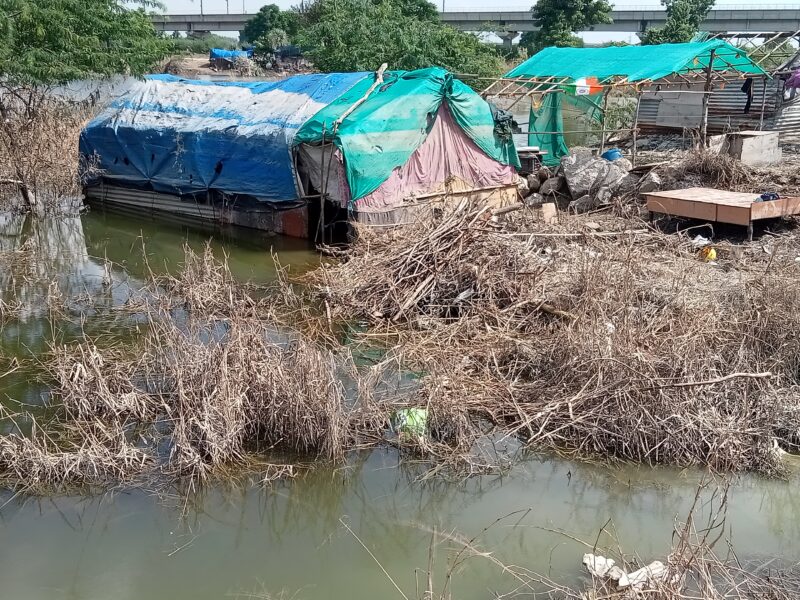
Most of the families in the area are shifting to lower plains as they wait for the water to recede. Ashish Kumar says that although drinking water was provided during the flood, there was no other facility. “Even the water tankers are not stopping by, and we have very little time to fill our cans so it becomes a hassle”, he says.
Kumar has been living in the area for the last two months after his house was bulldozed by the administration on the other side of the highway. “A lot of people shifted to other places as well. We were not provided any written notice and it happened all of a sudden”, he says. He is currently unemployed and the family is supported by his brother-in-law.
When Patriot asked about electricity supply, almost all the people said they either depend on solar panels or electricity theft.
Instagram: instagram.com/thepatriot_in/
Twitter: twitter.com/Patriot_Delhi
Facebook: facebook.com/Thepatriotnewsindia

